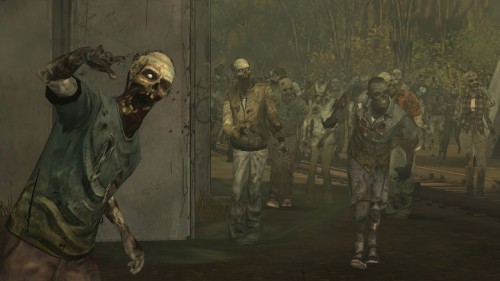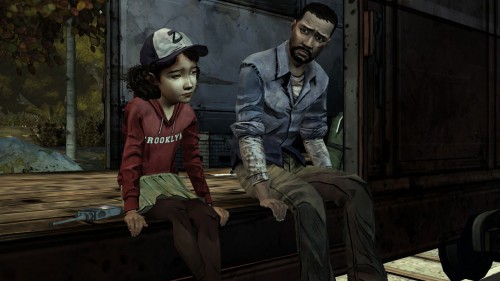It always seems to happen this time of year. There I am, happily whittling down my annual game of the year list, and then something comes along and throws it all off. Usually it’s a Christmas present or an acquisition in the new year sales that now seem to start at some point in mid-December, but occasionally it’s a game I overlooked that is suddenly being showered with accolades. I’d heard good things about Telltale Games‘ adaptation of The Walking Dead, but with its previous adventures frequently falling short of the promise of the subject matter – some being significantly better than others – I was content to wait for the inevitable Steam sale appearance.

The recent plaudits pushed that schedule forward, however, and I’ve been playing through an episode at a time over the last few days – as with watching a TV series on DVD, I find that to be a much more agreeable way to experience an episodic story.
It’s strange, because all those point-and-click classics are known for enjoyably obtuse puzzling and a great sense of humour, and this doesn’t really have either. There are puzzles and there are funny bits, sure, but neither is the main impetus behind progression. This is one of the great modern examples of pure interactive storytelling, as if a point-and-click adventure got spliced with one of those visual novels that occasionally makes it over from Japan.

The series’ implementation of branching story and player choice has understandably driven a lot of the acclaim. Generally it’s not as signposted as moral choices in most games, and if you turn off the annoyingly reductive on-screen notices whenever you do something that could affect a relationship or outcome it becomes the closest I’ve experienced to what interactive fiction has always promised about forcing the player to live with the consequences of their actions. Don’t expect much freedom here, though; this is out to tell a story, and you’re being funnelled towards the conclusion. You have control over which track you’re travelling on, yes, but it’s still on rails.
I won’t spoil anything specific about the plot because, with so little actual gameplay, the story really is everything, but I will touch on it in general terms. While it occasionally falls into that particularly gamey trap of signposting its branches too heavily, it really is one of the best stories I’ve come across in a game. The feeling that your choices make an impact is key, making many of the twists that turn out to be of your own making hit hard. It does that thing of telling a story without storytelling that Valve did so well with similar material in the Left 4 Dead games, with graffiti and seemingly unimportant background objects filling you in on what happened without stopping you from playing.
Next time I hope Telltale puts more effort into the technical side of things; glitches involving lost progress and choices not making the transition between episodes are widespread, and although I was able to salvage mine when it happened, it involved restoring backups and terminal commands. It wasn’t pretty. The developer’s silence on the issue has been deafening, which is unjustifiable when so many developers fall over themselves to roll out fixes to these issues. Let’s not forget that this series started in April and it’s still yet to receive a patch.
I tend to put the developer’s artistic intentions ahead of any technical shortcomings, though, and Telltale has achieved one of the best examples of interactive storytelling in recent memory. It comes closer than the likes of Heavy Rain to making you care and allowing you to cultivate a story that feels uniquely yours, even when you occasionally catch a glimpse behind the curtain.
